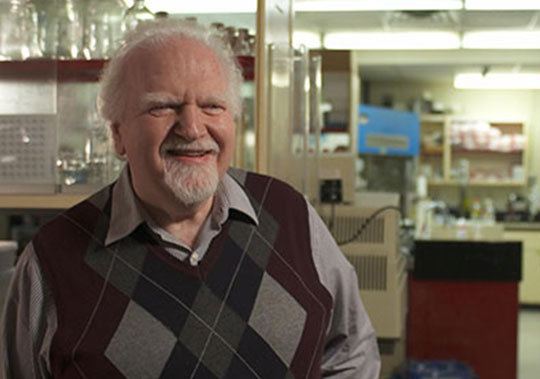Healthy sperm, healthy children
Pioneering McGill researcher studies the effects of environmental toxins on male sex cells

February 11, 2020
The global population is projected to reach 10 billion by 2057. Can the planet sustain this number of people? It’s a question that has long occupied scientists.
In 1972, a landmark report titled “Limits to Growth” suggested that within the next century, economic and population growth would surpass the planet’s capacity to support human beings with catastrophic effects.
The report sparked the zero growth movement and inspired Dr. Bernard Robaire, then an undergraduate student at University of California at Los Angeles to study male reproduction with the goal of finding a male contraceptive.
He came to McGill University to undertake his doctoral studies but, at that time, no male reproductive research programs existed in Canada. Undaunted Dr. Robaire went to the United States where he completed a postdoctoral fellowship at Johns Hopkins University.
After his post-graduate studies, Dr. Robaire returned to McGill University to conduct pioneering research on the development of male contraceptives, and the effects of environmental toxins on male sex cells.
In the process, Dr. Robaire, in collaboration with his colleague Dr. Hales, were prime movers in developing the field of male-mediated developmental toxicity. This field focuses on the study of sperm quality and the health effects that may be transmitted by fathers to their children through DNA mutations or epigenetic modifications.
These changes can result from exposure to toxic chemicals or the natural aging process, where over time the DNA and proteins in the chromosomes are modified. For example, the drugs used to treat men with cancer have toxic effects and Dr. Robaire has shown that exposure to anti-cancer drugs affects the way genes are expressed at key stages in sperm production.
This altered pattern of expression is hypothesized to result in adverse effects on the embryo and contribute to health problems in the father’s children. This finding is important when you consider the number of men who survive cancer and later wish to have children.
Other chemicals that Dr. Robaire has studied intensely are phthalates and brominated flame retardants.
Phthalates are used to make plastics flexible and are widely found in household and consumer products. People are exposed to these chemicals by eating or drinking from containers made with them, or breathing in particles of products containing these chemicals.
Exposure to phthalates is linked to low testosterone, low sperm count, and reproductive abnormalities in males – a clinical condition known as phthalate syndrome.
In partnership with colleagues in McGill’s chemical engineering department, Dr. Robaire is working to identify less toxic substitutes for phthalates. The team currently has two substitutes in testing that show no toxic effects.
Brominated flame retardants are added to many household and industrial products to delay them from catching fire or to prevent a fire from spreading. Exposure to these chemicals affects bone formation, thyroid levels, and human eggs at the very early stages of pregnancy.
As a result, regulatory agencies in Canada and other countries have restricted the use of brominated flame retardants to limit human exposure. It is anticipated that Dr. Robaire’s research will help guide decisions by Health Canada and Environment Canada, the federal government departments responsible for regulating toxic chemicals.
Men continue to make sperm throughout their lives. As a man ages, however, the quality of the sperm may decline because of exposure to environment toxins and also because of mutations to the DNA in their sperm cells, which occur gradually over time. There is evidence linking higher paternal age to increased rates of autism, attention deficit disorder, and other conditions, but more research needs to be done in this area.
To fill this gap, Dr. Robaire has been studying the link between paternal age, sperm quality, fertility, and child health. By better understanding this link, he will help men make decisions about becoming fathers, particularly later in life.
With his current focus on male reproductive health and its impact on child health, Dr. Robaire may seem far from his initial focus on contraception and population control. Yet, as the global population continues to grow, Dr. Robaire can take comfort in knowing his work may result in men producing healthy sperm – and fathers having healthy children.
Read more Health Research in Action articles.
- Date modified: